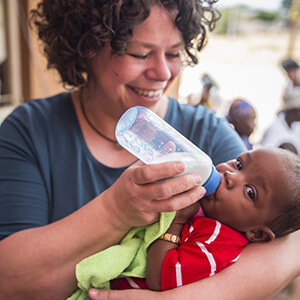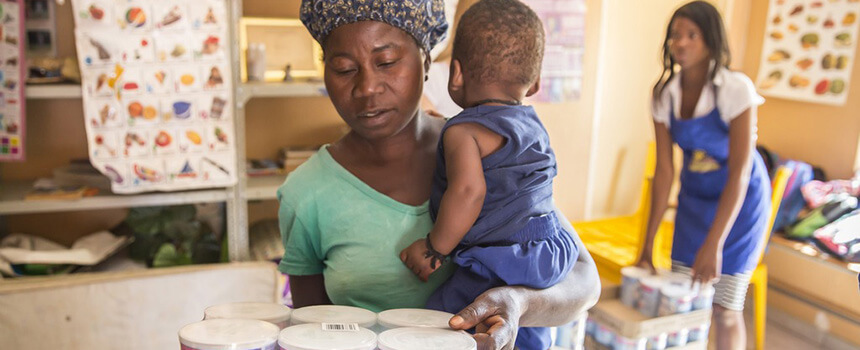 Thirst to life
Thirst to life
Powdered milk saves little children in Namibia from contracting HIV
Rosalie always feels bad when she looks her five-year-old son in the eyes. This young mother is HIV positive, but when her son was born, she did not have the money to buy the expensive milk substitute for him and so saw no choice but to breast-feed him. But that is a way how HIV positive mothers can pass the disease on to their children. Rosalie’s son was infected with HIV in this way. A nurse at the maternity ward of Namibia’s only state-run hospital in Windhoek was confronted with this problem on a daily basis. Mothers would ask her for powdered milk to protect their babies. She couldn’t stand idly by and so at first, she bought powdered milk with her own money, but later managed to find donors and volunteers with whom she founded the Mount Sinai Centre, where HIV-positive mothers are provided with powdered milk.
Necessity
Powdered milk as a substitute for mother’s milk to protect HIV negative babies of HIV positive mothers from being infected
Activity
The Mount Sinai Centre buys powdered milk and distributes it to the HIV negative babies of HIV positive mothers
Countable effort
Number of cans of powdered milk that are distributed to HIV positive mothers to give to their babies.
Result
By feeding with powdered milk it is expected that approx. 200 babies per year will be protected from an HIV infection.
Systemic effect
Children in Namibia are given the opportunity of a better future without HIV infection. The country gets a healthy next generation.
Background
In Namibia, HIV has been the primary cause of death since 1996. Officially 14.3 % of the population are infected, but the actual figure is estimated to be higher then 20 %. The Namibian government has taken on the struggle against the disease, for instance by providing life-saving medications free of charge. This is a crucial step, but the state-run system has major deficiencies. Mother’s milk is the most nutritious food for babies – and in poor countries, it is often the only option. But if mothers are infected with the AIDS virus, they can pass the disease on to their child by breast-feeding. The risk of infecting a healthy child with HIV by breast-feeding is 7 to 22 %. The only effective protection is feeding the child with milk substitute, but this is very expensive in Namibia. And since more than 50 % of the population in Namibia live below the poverty line, many women cannot afford such substitute food.
The good deed
The Mount Sinai Centre takes care of and provides powdered milk to 100 babies of HIV positive mothers. Once a month, the mothers come to the heath centre with their babies in order to pick up their allocated amount. At the same time, all babies receive a health check to make sure they develop normally.
Challenge
The goal of the Mount Sinai Centre is to protect the next generation of children from HIV and to support them on their way to a better life. Major challenges are Namibia’s social problems, such as poverty, frequent (sexual) violence, high unemployment, very rare educational opportunities and many others. Only through intensive support and the struggle for the welfare of each child can this danger be averted.

AboutNamibia
Windhoek
Capital
2 458 800
Number of inhabitants
5 041 USD
Gross domestic product per capita per year
126
Human Development Index
Namibia is the country with the 6th highest rate of HIV/AIDS infection in the world
About the organization and further information
Association
Artemed Foundation
Website
http://www.artemedstiftung.de/
Transparency International




